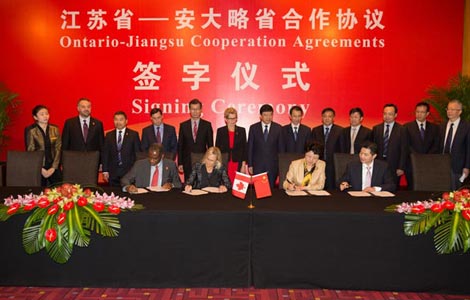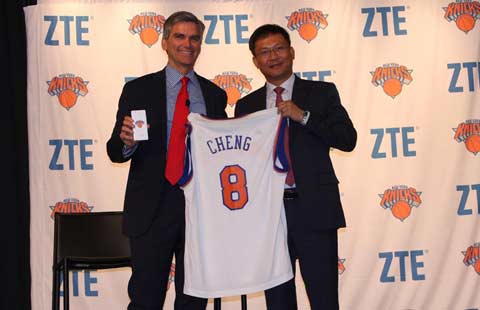Chinese Internet companies find Brazil attractive
Updated: 2014-11-01 05:35
By JI YE in Rio de Janeiro(China Daily USA)
|
|||||||||
During his visit to Brazil in July, Chinese President Xi Jinping and his Brazilian counterpart Dilma Rousseff watched the launch of the Portuguese version of China's Baidu search engine.
Early in October, China's biggest Internet search engine acquired the controlling stake in the Brazilian online-discount company Peixe Urbano for an undisclosed sum.
Rio de Janeiro-based Peixe Urbano has some 25 million registered users in Brazil and more than 30,000 companies as merchant partners.
Li Yanhong, president of Baidu, said in July in Brasilia that his company would invest 120 million reais ($50 million) in Brazil over the next three years. A large part of that is believed to be earmarked for promoting Peixe Urbano.
Along with Baidu, Chinese Internet companies are attaching more importance on having a presence in Latin America's biggest economy.
AliExpress, part of China's Alibaba Group, has become one of the most popular e-commerce sites in Brazil. According to Wang Wei, who is in charge of AliExpress Brazil, the number of requests from the Brazilian market has begun to soar since 2013.
Wang said that Brazil has enough of a population base and is experiencing sound economic development to make it attractive to Internet companies.
To explore more opportunities, in May AliExpress Brazil started to promote its elite sellers to enter the Brazilian market.
In Brazil, production of household consumer products is weak and cannot meet growing demand, which provides tremendous business opportunities for Alibaba.
Third-party data show that Brazil has become AliExpress's second-largest market in the world, with its sales accounted for nearly 50 percent of Brazilian overseas online shopping.
Why are Chinese Internet companies putting great emphasis on Brazil?
It is the world's fifth-largest Internet market. Among the population of 200 million, nearly 90 million are Internet users and online shopping is becoming fashionable.
Ii is the seventh-largest consumer country among the world's economic powers; its per capita GDP is $11,000.
Brazilian e-commerce reached(WHEN? 2013?)28.5 billion reais in year-on-year growth of 25 percent. This year, driven by the FIFA World Cup and other factors, the amount is expected to increase by 20 percent and growth in the next two years' will not fall below 18 percent.
Brazilian people will spend five billion reais this year on overseas online shopping.
Apart from the e-commerce, Chinese internet companies also focus on Internet safety and instant messaging in the Brazilian market.
In July, Rio de Janeiro-based PSafe launched antivirus products for Android and for Windows. China'sQihoo 360has been a main investor and technology partner with PSafe.
In partnership with Qihoo 360, PSafe's cyber-safety products inPortuguese-languagehave 40 percent of the market share in Brazil, while the Spanish version also is in Mexico, Argentina and Chile.
Qihoo 360 has invested $25 million in it andsent technicians to provide support technology to Brazil.PSafe CEO Marco De Mello said that with Chinese supporting technology, Psafe aims to occupy half of the Latin American market before the end of 2015.
The cross-platform mobile messaging app WeChat, a Chinese version of Whatsapp, has grown faster in adoption, notably in Brazil. With soccer superstar Lionel Messi as its global ad star, the China-made messaging app has quickly established itself as a major global force within social networking.
These Chinese Internet companies face a long journey to fully internationalize and localize. They must study the preferences, customs and interests of Internet users overseas, and they also have to face established Internet giants' advantages in brands, technology and customer groups.

 Ontario officials seek business in China
Ontario officials seek business in China
 Tibetan culture to display splendor in Canada
Tibetan culture to display splendor in Canada
 Run or dye - Color Run comes to Guangzhou
Run or dye - Color Run comes to Guangzhou
 Art Taipei 2014 draws international artists
Art Taipei 2014 draws international artists
 Halloween fun in China
Halloween fun in China
 Reclaiming a piece of history
Reclaiming a piece of history
 Across Americas over the week (Oct 24-30)
Across Americas over the week (Oct 24-30)
 At least 4 killed in small plane crash in Kansas
At least 4 killed in small plane crash in Kansas
Most Viewed
Editor's Picks

|

|

|

|

|

|
Today's Top News
Xi urges serious reflection on Xu Caihou's case
China amends law to support citizens suing gov't
China Internet companies find Brazil attractive
China ratifies national Constitution Day
China passes Counterespionage Law
China convicts over 13,000 officials for bribery
Premier outlines Afghan proposals
Canada PM on trade mission in China
US Weekly

|

|








